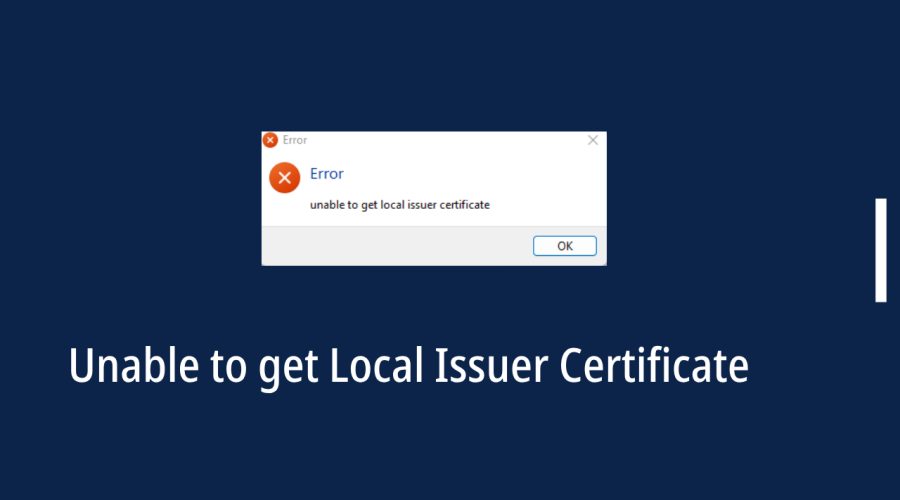SSL certificates play a crucial role in ensuring the safety of data transmitted over the internet. However, encountering SSL certificate problems is not uncommon. One such issue is the “SSL Certificate Problem: Unable to Get Local Issuer Certificate.” This error can be frustrating, but it’s essential to address it promptly to maintain a secure online presence. Unable to Get Local Issuer Certificate’ arises when the system can’t find a trusted local certificate authority to authenticate an SSL certificate. In this comprehensive guide, we will explore the causes of this problem and provide step-by-step solutions to fix it.
Understanding SSL Certificates
SSL (Secure Sockets Layer) certificates are essential for establishing secure connections between web browsers and web servers. They encrypt the data exchanged between the two, preventing unauthorized access and ensuring data integrity. SSL certificates are issued by Certificate Authorities (CAs) and play a pivotal role in securing online transactions, login credentials, and sensitive information.
The “SSL Certificate Problem: Unable to Get Local Issuer Certificate” Error
When you encounter the error message “SSL Certificate Problem: Unable to Get Local Issuer Certificate,” it means that your system or application is unable to verify the authenticity of the SSL certificate presented by the remote server. This error signifies that the system lacks the local certificate authority needed to verify the SSL certificate, causing the issue. This issue can arise due to various reasons, including:
- Missing Root Certificate: Your system might lack the necessary root certificate required to verify the SSL certificate’s chain of trust.
- Outdated CA Bundle: An outdated or corrupted Certificate Authority (CA) bundle on your server can also trigger this error.
- Misconfiguration: Incorrect configurations in your web server or application settings can lead to SSL certificate verification failures.
- Firewall or Proxy Issues: Network restrictions imposed by firewalls or proxies can interfere with SSL certificate verification.
- Expired or Revoked Certificate: If the SSL certificate presented by the server has expired or is revoked, it will fail the verification process.
Now that we understand the potential causes of this SSL certificate error,
Let’s explore the steps to fix it.
- Update Your CA BundleA common solution to the “Unable to Get Local Issuer Certificate” error is to update the CA bundle on your server. You can download the latest CA bundle from trusted sources like the Mozilla CA Certificate Store or your operating system’s package manager.
For Linux (Debian/Ubuntu):
sudo apt-get update
sudo apt-get install --reinstall ca-certificates
For Linux (Red Hat/CentOS):
sudo yum update
sudo yum reinstall ca-certificates
For Windows: Download the latest CA bundle from the Mozilla website and follow the installation instructions.
- Check System Time and DateSSL certificate verification relies on accurate system time and date settings. Ensure that your server’s clock is correctly configured, including the timezone.
- Verify SSL Certificate ChainUse online SSL certificate validation tools like SSL Labs or Qualys SSL Server Test to check the SSL certificate chain of the remote server. Ensure that the certificate chain is complete and valid.
- Install Missing Root CertificatesIf the SSL certificate relies on a root certificate that is not included in your CA bundle, you will need to download and install it manually.
For Linux:
sudo cp root-cert.crt /usr/local/share/ca-certificates/
sudo update-ca-certificates
For Windows: Import the missing root certificate into the Windows Certificate Store.
- Disable SSL Verification (Not Recommended)While not recommended for production environments, you can temporarily disable SSL verification to bypass the error. This should only be considered a last resort, as it compromises security.
For cURL:
curl -k https://example.com
- Review Firewall and Proxy SettingsIf you are behind a firewall or proxy, ensure that they are not interfering with SSL certificate verification. Check the configurations and whitelist the necessary domains.
Conclusion
Encountering the “SSL Certificate Problem: Unable to Get Local Issuer Certificate” error can be perplexing, but understanding its root causes and following the appropriate steps can help you resolve it effectively. It’s essential to maintain a secure online presence, and addressing SSL certificate issues is a crucial aspect of that endeavor. By keeping your CA bundle up to date, verifying certificate chains, and ensuring correct system configurations, you can ensure a safe and seamless browsing experience for your users.
Remember that disabling SSL verification should only be considered as a temporary measure, and it’s vital to reinstate proper verification as soon as possible to maintain the security of your web applications and services. Stay vigilant, keep your system updated, and prioritize security in the ever-evolving digital landscape.
FAQs
Why am I unable to get the local issuer certificate download?
Downloading the issuer certificate might not be necessary or even possible in all situations. Unable to get issuer certificate error typically indicates a missing certificate already present on your system, not an issue with downloading a new one.
What is client certificate error unable to get local issuer certificate?
Unable to get issuer certificate error variant happens when a website requires a client certificate for authentication, and your system lacks the necessary certificate or the issuer certificate required to verify its validity.
How to fix git SSL certificate error?
If encountering unable to get issuer certificate error with Git, try these options:
Update Git: Ensure you're using the latest Git version.
Set the CAfile environment variable: This tells Git to use a specific certificate authority file for verification. You can find instructions for setting this variable online based on your operating system.
Ignore the certificate: (Use with caution) This is not recommended for security reasons, but you can use the --no-verify flag with Git commands to bypass certificate verification (not ideal for production environments).
What is error 503 unable to get issuer certificate?
The error code 503 usually indicates a server-side issue. In this case, the server might have problems with its own SSL certificate configuration, causing the "unable to get local issuer certificate" message for clients.
What does unable to get issuer certificate mean?
Unable to get issuer certificate mean signifies that your system cannot verify the authenticity of a website's security certificate because it lacks the necessary information to validate the certificate chain. It typically refers to a missing intermediate certificate or an issue with the root certificate authority trusted by your system.

Gloria Bradford is a renowned expert in the field of encryption, widely recognized for her pioneering work in safeguarding digital information and communication. With a career spanning over two decades, she has played a pivotal role in shaping the landscape of cybersecurity and data protection.
Throughout her illustrious career, Gloria has occupied key roles in both private industry and government agencies. Her expertise has been instrumental in developing state-of-the-art encryption and code signing technologies that have fortified digital fortresses against the relentless tide of cyber threats.
